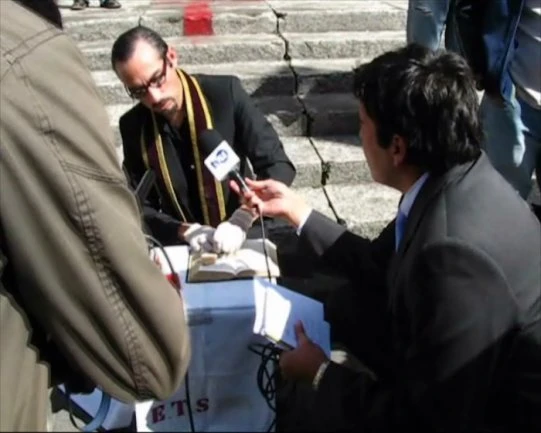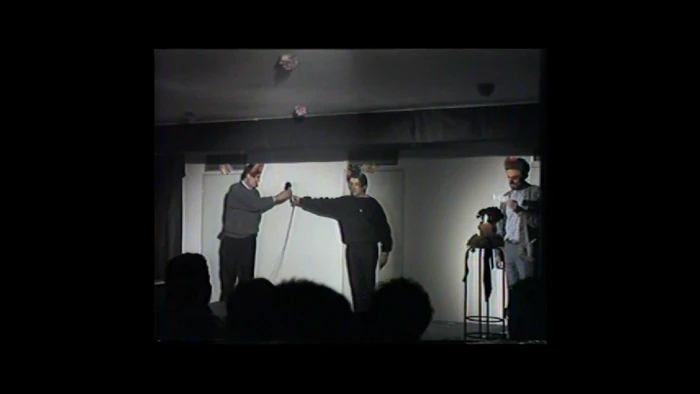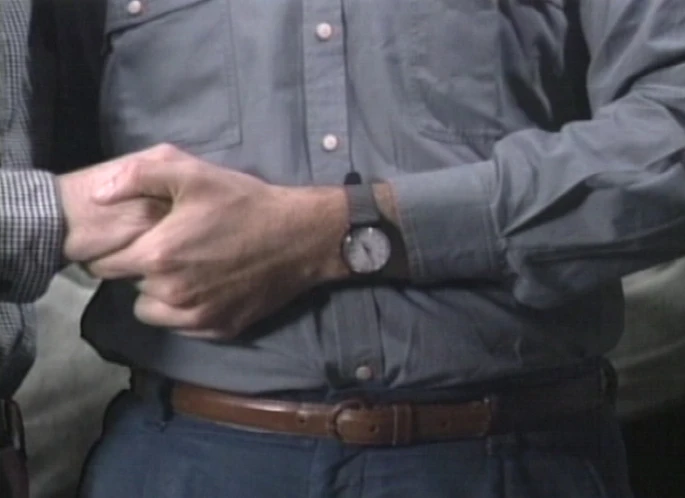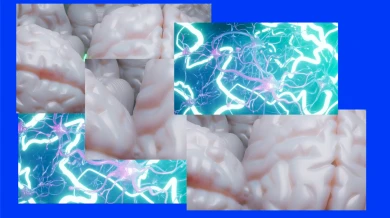-
December 11, 2013
Information / Counter-information
Agustí Camps, Jordi Castañé, Jordi Guillemot and Pere Roca. TV-SIDA
Video, 1993. 36’ [screening of extracts]. Copy provided by the Documentation Centre at Museo Reina Sofía
Carrying Society / Prospecciones Urbanas S.A. ¿Sabes si...? Prospecciones # 700-738
Video, 1997? 27’ [screening of extracts]. Copy courtesy of a private archive
Guillermo Moscoso. Geno-Sida
Video, 2009. 10’. Copy courtesy of the artist
This block looks at one of the main battlefields of AIDS-related critical practices, an area that would mark an important aspect of the micropolitics taking place in the 21st century: information as an object of struggle. -
December 11, 2013
Displacing the Espaliú paradigm
Las Pekinesas (Miguel Benlloch, Tomás Navarro and Rafael Villegas). SIDA DA
Video, 1985. 8’ 49”. Copy courtesy of Ático Siete, Granada
Virginia Villaplana and Liliana Couso (for LSD). Retroalimentación
Video, 1998. 5’. Copy courtesy of Hamaca, Barcelona
Águeda Bañón. El tajo
Video, 1996. 3’. Copy courtesy of the artist
Pepe Miralles. Despedida circular
Video, 1995. 1’ 58”. Copy courtesy of the artistThis block adds further nuances to the usual characterisation of Pepe Espaliú (1955-1993) as a paradigmatic figure in the critical forms of AIDS cultural production. It does so by introducing a series of pieces that are less visible and that together make up a more complex cartography of AIDS policies in Spain. This block is not intended to be a “critique of Espaliú” but rather a deeper analysis of this subject’s foundational narratives.
-
December 11, 2013
Ritualities / rejection of “bare death”
Gloria Camiruaga. Yeguas del apocalipsis
Betacam SP, 1990. 6’ 20’’. Copy courtesy of Heure Exquise!, France
Gloria Camiruaga. Casa particular
Betacam SP, 1990. 9’ 30’’. Copy courtesy of Heure Exquise!, France
Francisco Copello. Hello Again
Video, 2005. 13’. [screening of extract]. Copy courtesy of Francisca Vargas (Archivo Copello) and Claudio Marcone
Rafael França. Prelúdio de uma morte anunciada
Video, 1991. 5’. Copy courtesy of the Jacqueline Martins Gallery, Sao Paulo
This block proposes the ritualisation and signification of death as an interpretive key to large part of the artistic production related to AIDS which, according to the postcolonial theorist Jean Comaroff, is an attempt to avoid the ultimate abjection of "bare death."
Video as an AIDS counter-archive

Guillermo Moscoso. Geno-Sida. Vídeo, 2009
Held on 11 Dec 2013
AIDS Anarchive began within the framework of the 2012-2013 research residencies at Museo Reina Sofía, as part of the production process of a “counter-archive” or an anarchive of AIDS policies, with attention being paid for the first time to practices occurring outside of the Anglo-Saxon or Western and Central European settings. This activity, a video session accompanied by the commentary of the researchers and curators, Aimar Arriola and Nancy Garín, partially explains the research project and marks the end of the project’s research visit at the Museum.
As one of the initial hypotheses, the researchers examined specific case studies as a means to explore the functions of the archive and of archival practices within the array of critical forms of cultural production related to AIDS since the late 1980s. In them we find an opportunity to radically question the logic of access or exclusion and of archival representation privileges. [dropdown]
AIDS cultural activism soon came to occupy archival space. According to queer theorist Roger Hallas (Reframing Bodies, 2009) in his discussion of what he describes as queer AIDS media, it would do so considering the archive not just a space for the preservation of material and memory but rather as a tool that gives evidence of the demands of the present. Following Hallas, but taking the matter a step further, the intention here is to propose that AIDS-related critical videographic production should be viewed as one of its possible counter-archives.
While video as an artistic medium and form of counter-information appeared in North America and Western Europe during the early gay liberation movements and second-wave feminism of the late 1960s, in Spain and other contexts with post-dictatorial regimes, such as Chile and Brazil, it would take another two decades or more for the critical use of video among artists and activists to gain strength. In fact, the consolidation of video would take place in parallel with the expansion of globalisation and its economic driving force, neoliberal policies; in other words, the very context in which AIDS appeared.
In this regard, the alignment of AIDS and video has favoured the emergence of local responses to the global dimension of the pandemic, as shown, in part, by this selection of videos, in which, as the Chilean writer and essayist Lina Meruane (Viajes Virales, 2012) puts it, the AIDS body no longer appears as a prominent sign of globalisation, but rather as its counter-face, its negative figuration, that which is capable of declaring checkmate on the deceptive semantics of the global flow. [/dropdown]
Organised into three critical blocks, the program is conceived as an initial manifestation of this counter-archive, albeit limited to the time and extension of one day of video, and it includes the work of the following artists, collectives and initiatives:
Activity organised in connection with
In collaboration with
Fundación Banco Santander and CRUMA



Más actividades

Difficulty. Forms and Political Effects of Deviation in Writing and Contemporary Art
23 February – 14 December 2026 – Check programme
Difficulty. Forms and Political Effects of Deviation in Writing and Contemporary Art is a study group aligned towards thinking about how certain contemporary artistic and cultural practices resist the referentiality that dominates the logics of production and the consumption of present-day art. At the centre of this proposal are the concepts of difficulty and deviation, under which it brings together any procedure capable of preventing artistic forms from being absorbed by a meaning that appears previous to and independent from its expression. By ensuring the perceptibility of their languages, difficulty invites us to think of meaning as the effect of a signifying tension; that is, as a productive and creative activity which, from the materiality of art objects, frees aesthetic experience from the representational mandate and those who participate in it from the passiveness associated with tasks of mimesis and decoding.
The economy of the referential norm translates the social logic of capitalism, where insidious forms of capturing subjectivity and meaning operate. In the early 1980s, and adopting a Marxist framework, poet Ron Silliman highlighted how this logic entailed separating language from any mark, gesture, script, form or syntax that might link it to the conditions of its production, rendering it fetichised (as if without a subject) and alienating its users in a use for which they are not responsible. This double dispossession encodes the political strategy of referential objectivity: with no subject and no trace of its own consistency, language is merely an object, that reality in which it disappears.
The political uses of referentiality, more sophisticated today than ever before, sustain the neoliberal-extractivist phase of capitalism that crosses through present-day societies politically, economically and aesthetically. Against them, fugitive artistic practices emerge which, drawing from Black and Queer studies and other subaltern critical positions, reject the objective limits of what exists, invent forms to name what lies outside what has already been named, and return to subjects the capacity to participate in processes of emission and interpretation.
Read from the standpoint of artistic work, the objective capture of referentiality may be called transparency. Viewed from a social contract that reproduces inequality in fixed identity positions, transparent in this objectivity are, precisely, the discourses that maintain the status quo of domination. Opposite the inferno of these discourses, this group aims to collectively explore, through deviant or fugitive works, the paradise of language that Monique Wittig encountered in the estranged practices of literature. For the political potency of difficulty — that is, its contribution to the utopia of a free language among equals — depends on making visible, first, its own deviations; from there, the norm that those deviations transgress; and finally, the narrowness of a norm which in no way exhausts the possibilities ofsaying, signifying, referring and producing a world.
From this denouncement of referential alienation, fetishisation and capture, Difficulty. Forms and Political Effects of Deviation in Writing and Contemporary Art turns its attention to the strategies of resistance deployed by contemporary artists and poets. Its interest is directed towards proposals as evidently difficult or evasive as those of Gertrude Stein, Lyn Hejinian, Theresa Hak Kyung Cha, Kameelah Janan Rasheed, Kathy Acker, María Salgado and Ricardo Carreira, and as seemingly simple as those of Fernanda Laguna, Felix Gonzalez Torres and Cecilia Vicuña, among other examples that can be added according to the desires and dynamics of the group.
The ten study group sessions, held between February and December, combine theoretical seminars, work with artworks from the Museo Reina Sofía’s Collections and exhibitions, reading workshops and public programs. All these formats serve as spaces of encounter to think commonly about certain problems of poetics — that is, certain political questions — of contemporary writing and art.
Difficulty. Forms and Political Effects of Deviation in Writing and Contemporary Art inaugurates the research line Goodbye, Representation, through which the Museo Reina Sofía’s Studies Directorship seeks to explore the emergence of contemporary artistic and cultural practices which move away from representation as a dominant aesthetic-political strategy and redirect their attention toward artistic languages that question the tendency to point, name and fix, advocating instead for fugitive aesthetics. Over its three-year duration, this research line materializes in study groups, seminars, screenings and other forms of public programming.

27th Contemporary Art Conservation Conference
Wednesday, 4, and Thursday, 5 March 2026
The 27th Contemporary Art Conservation Conference, organised by the Museo Reina Sofía’s Department of Conservation and Restoration, with the sponsorship of the Mapfre Foundation, is held on 4 and 5 March 2026. This international encounter sets out to share and debate experience and research, open new channels of study and reflect on conservation and the professional practice of restorers.
This edition will be held with in-person and online attendance formats, occurring simultaneously, via twenty-minute interventions followed by a five-minute Q&A.

Cultural Work
Thursday, 12 February 2026 – 5:30pm
This series is organised by equipoMotor, a group of teenagers, young people and older people who have participated in the Museo Reina Sofía’s previous community education projects, and is structured around four themed blocks that pivot on the monstrous.
Session number two looks to approach film as a place from which cultural work is made visible and processes of production engage in dialogue with artistic creation. From this premise, the session focuses on exploring how audiovisual content is produced, assembled and distributed, from the hands that handle the images to the bodies that participate in its circulation. The aim is to reflect on the invisible effort, precarity and forms of collaboration that uphold cultural life, that transform the filmic experience into an act that recognises and cares for common work.

Alberto Greco. Viva el arte vivo
Tuesday, 10 February 2026 – 7pm
In conjunction with the opening of the exhibition Alberto Greco. Viva el arte vivo, Fernando Davis, the show’s curator, and Amanda de la Garza, the Museo Reina Sofía’s deputy artist director, will converse in the Nouvel Building’s Auditorium 400 on the life and work of the Argentinian artist, a core figure in experimental avant-garde art.
The title of both exhibition and conversation originates from the proclamation “Long Live Arte Vivo” Alberto Greco (Buenos Aires, 1931— Barcelona, 1965) disseminated around the streets and on the walls of Rome. For Greco, arte vivo was an art of the future, an art based on a set of irreverent and untimely gestures, of adventures open to unpredictability melding with life, and which began in 1962, prior to his coining of the term “vivo-dito”. In his Manifiesto dito dell´arte vivo (Dito Arte-Vivo Manifesto), which he pasted on the walls of Genoa, Greco encouraged new contact “with the living elements of our reality: movement, time, people, conversations, smells, rumours, places, situations”. He would also burst into the everyday of Madrid’s streets as he convened a “vivo-dito moment”, culminating in the burning of a canvas painted collectively in Madrid’s Lavapiés neighbourhood.
In addition to founding arte vivo, Alberto Greco was an informalist painter, a queer flâneur, a poet and sometime actor. This intense journey of Greco’s life and art is closely connected to the migrant route he embarked upon in 1950 in Buenos Aires, taking in Atacama and Humahuaca, Paris, Rio de Janeiro, São Paulo, Genoa, Rome, Madrid, Piedralaves, New York and Ibiza and ending abruptly in Barcelona, where he took his own life shortly after writing his final great work, the novel Besos brujos (Bewitching Kisses, 1965).
These inaugural conversations, part of the main working strands of the Museo’s Public Programmes Area, aim to explore in greater depth the exhibition narratives of the shows organised by the Museo from the perspective of artists, curators and specialists.
![Basel Abbas y Ruanne Abou-Rahme, At Those Terrifying Frontiers Where the Existence and Disappearance of People Fade Into Each Other [En esas fronteras aterradoras donde la existencia y la desaparición de personas se disuelven entre sí], 2019](https://recursos.museoreinasofia.es/styles/small_landscape/public/Colecci%C3%B3n/abbasabourahme.png.webp)
Gaza and Aestheticide
Tuesday February 10, 2026 – 16:00 h
“This seminar examines the systematic destruction of Palestinian collective sensibility — what we might call ‛aestheticide’ — that has accompanied Israel’s genocide and ecocide in Gaza, and considers the conditions of artistic practice in its aftermath. Over more than two years, the demolition of universities, archives, museums, and libraries has not only erased cultural and intellectual infrastructure but has also targeted the very possibility of representation itself. The destruction of a people has been accompanied by the destruction of their image, their history, and their capacity to be known: reportage, scholarship, and cultural memory have been deliberately undermined, with media institutions, universities, and museums often complicit in this repression. Gaza consequently functions as a rehearsal space for a possible global future — of fascism, post-liberal authoritarianism, militarized borders, and AI-enabled warfare —, a laboratory for an emerging world order. What, then, becomes of critical analysis and resistance under these conditions? And what becomes of aesthetics and politics?”
—T.J. DemosThis seminar takes place thanks to the art historian’s invitation to Spain by the Miró Foundation. In the context of the museum, it engages in dialogue with a broader line of work on the climate emergency and decolonial perspectives developed within the Museum of the Commons project (2023–2026) of the L’Internationale network, of which the Museo Reina Sofía is a member; as well as with some of the questions that animate the study group Aesthetics of Peace and Desertion Tactics. Finally, it is also embedded in a wider strategy of support for and commitment to the artistic and discursive practices of Palestinian artists and cultural practitioners, most clearly reflected in the TEJA network.